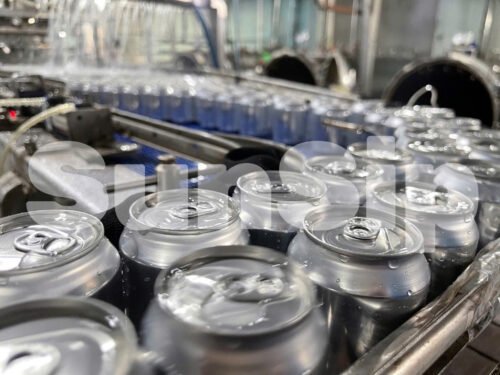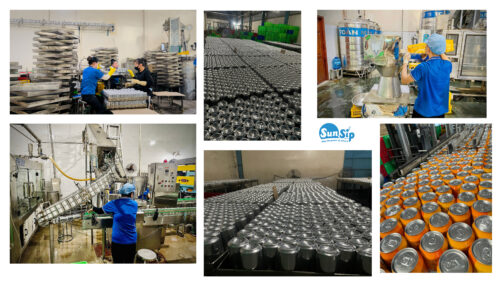Introduction
In recent years, the global demand for plant-based and tropical beverages has soared—placing coconut milk among the fastest-growing segments in the functional drinks market. Its creamy texture, unique taste, and health benefits have made it a favorite not only among health-conscious consumers but also in international kitchens, food processing, and beverage applications.
One of the most convenient formats for coconut milk distribution today is the aluminum can. This packaging method extends shelf life, facilitates global export, and supports consistent quality standards across markets.
At the heart of this movement is Sunsip Beverages Vietnam, a trusted name in Vietnam’s beverage manufacturing industry. Among its premium export lines, Sunsip Coconut Milk in cans stands out as a strategic product designed for high-performance manufacturing and seamless international delivery.

Introducing Sunsip Coconut Milk: Modern Production & Export Capabilities
🌿 State-of-the-Art Production Facilities
Sunsip Coconut Milk is crafted in a modern production facility located in Vietnam—home to some of the world’s finest coconuts, especially from the Mekong Delta region of Bến Tre. The factory operates under international certifications including:
-
ISO 22000
-
HACCP
-
FSSC 22000
-
HALAL certification
-
FDA and SFDA compliance
Sunsip utilizes UHT (Ultra High Temperature) technology and aseptic filling to ensure the coconut milk retains its natural taste and nutrients while remaining shelf-stable for up to 18–24 months.
The manufacturing line includes advanced equipment for:
-
Homogenizing and sterilizing coconut milk
-
Vacuum degassing and can filling
-
Double seaming with precision for leak-proof sealing
-
Inline quality control using automated sensors and visual inspection
🌍 Global Export Strength
Sunsip Coconut Milk in cans is exported to over 20 countries, including:
-
Middle East (Iraq, UAE, Saudi Arabia)
-
Asia (Japan, South Korea, China)
-
Africa (Ghana, Nigeria)
-
Europe (Germany, Netherlands)
-
North America (OEM/private label)
With multilingual labeling capabilities, custom branding options, and comprehensive export documentation (CO, CQ, Health Certificate, Free Sale Certificate, etc.), Sunsip ensures a smooth journey from factory to global shelves.

Benefits of Coconut Milk in Cans
✅ Long Shelf Life
Canned coconut milk offers a shelf life of 12 to 24 months without refrigeration, thanks to its airtight seal and thermal processing. This makes it an ideal solution for long-distance shipping, bulk storage, and export markets with limited cold chain infrastructure.
✅ Convenient for Transport and Storage
Aluminum cans are lightweight, stackable, and less fragile compared to glass bottles. This reduces breakage during shipping and lowers freight costs. Retailers and distributors also appreciate the compact and uniform packaging, which fits well on store shelves.
✅ Consistency and Quality Control
Canned coconut milk ensures uniform texture and taste across batches. Sunsip’s quality assurance team performs continuous checks for pH, fat content, microbial load, and sensory evaluation to meet strict international standards.
✅ Ready for OEM/Private Label Production
Sunsip offers OEM and private label manufacturing, allowing global partners to develop their own coconut milk brands with customizable can sizes (330ml, 400ml, 500ml), designs, and formulations. This flexibility is key for international buyers aiming to tailor products for specific consumer preferences.
✅ Recyclable and Eco-Friendly Packaging
Aluminum cans are 100% recyclable, aligning with the sustainability goals of modern consumers and retailers. With growing emphasis on eco-conscious packaging, canned coconut milk presents a responsible choice.
Limitations of Coconut Milk in Cans

Despite its advantages, there are a few considerations and limitations to keep in mind:
⚠️ Potential Changes in Taste or Texture
During the sterilization process, coconut milk may slightly alter in flavor or separate over time. While shaking the can before use solves this, some consumers may prefer the fresher taste of refrigerated or freshly squeezed options.
⚠️ BPA Concerns (Bisphenol A)
Older cans may contain BPA in their linings, a chemical linked to health concerns. Sunsip addresses this by using BPA-NI (BPA-Not Intent) cans, compliant with the latest food safety standards in the U.S. and EU markets.
⚠️ Limited Customization Post-Production
Once the coconut milk is canned and sealed, altering the product—whether in formulation or packaging—is not feasible. This makes it crucial for OEM clients to finalize their specifications before production begins.
⚠️ High Initial Equipment Investment
For manufacturers planning to establish a canned coconut milk line, the initial capital investment in machinery, QA systems, and staff training is substantial. However, working with an established OEM partner like Sunsip can help reduce this barrier to entry.
Key Considerations for Manufacturers and Exporters
For businesses evaluating canned coconut milk production or import, several factors can influence product success:
📌 Sourcing Quality Raw Materials
Sunsip sources its coconuts from certified farms in Vietnam, known for high oil content and natural sweetness. This results in a creamier, richer coconut milk.
📌 Compliance with International Regulations
Exporting to regions like the EU, US, or Middle East requires meeting food safety and documentation standards. Sunsip ensures full compliance with:
-
FDA (U.S. Food and Drug Administration)
-
SFDA (Saudi Food & Drug Authority)
-
GSO (Gulf Standardization Organization)
-
Asian food safety protocols
📌 Labeling and Packaging
Effective packaging is not only about aesthetics—it must also meet language, nutrition labeling, barcode, and import labeling requirements. Sunsip provides professional support in layout, branding, and regulatory compliance.
📌 Reliable Export Logistics
Sunsip collaborates with experienced freight and customs agents to manage:
-
Ocean and air freight coordination
-
Certificate of origin and phytosanitary inspections
-
Customs clearance support
-
Warehouse and container optimization
Conclusion
Coconut milk in cans is a smart, scalable, and efficient choice for manufacturers and global distributors looking to tap into the growing demand for plant-based beverages. With a long shelf life, robust packaging, and adaptability for private label production, canned coconut milk offers a compelling business case.
Yet, manufacturers must also weigh its limitations—from BPA concerns to taste variation and fixed packaging. Choosing the right production partner is key to overcoming these challenges.
With its cutting-edge facilities, international certifications, and proven export experience, Sunsip Beverages Vietnam is ideally positioned to help brands succeed in the global market. Whether you’re a beverage startup, a retail chain, or a foodservice distributor, Sunsip Coconut Milk offers reliability, quality, and the full flexibility of OEM manufacturing.